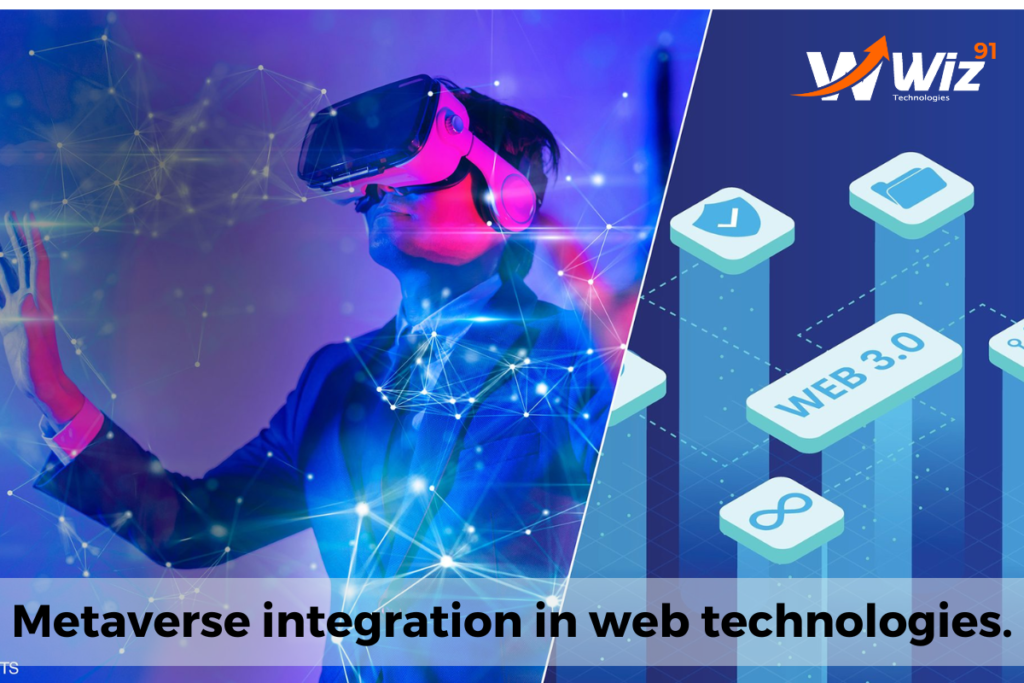In recent years, the concept of the Metaverse Integration has evolved from science fiction into a tangible digital reality. A metaverse is a collective virtual shared space that combines physical and digital realms, enabling users to interact with each other and digital objects in real-time. As this concept gains momentum, its integration with web technologies becomes a pivotal topic. In this article, we’ll delve into the intersection of the metaverse and web technologies, exploring its potential impact on various aspects of our digital lives.
The Evolution of the Metaverse Integration:
The Metaverse Integration is an expansive digital universe where users can immerse themselves in a variety of virtual experiences. With the advent of powerful computing, augmented reality (AR), virtual reality (VR), and blockchain technologies, the metaverse is now closer to reality than ever before. This evolution coincides with the advancement of web technologies, creating a symbiotic relationship that is shaping the future of digital interactions.
Metaverse Integration and Web Technologies:
The integration of the metaverse with web technologies presents a multitude of opportunities across different domains:
Social Interaction and Communication:
Web technologies have been instrumental in shaping how we communicate and connect with others online. In the metaverse, these technologies take on new dimensions, enabling users to engage in immersive social experiences. Virtual reality chat rooms, 3D avatars, and spatial audio technologies are enhancing the way we interact in digital spaces. As metaverse integration continues, web-based communication tools will likely evolve to provide seamless connectivity between the physical and virtual worlds.
E-Commerce and Virtual Marketplaces:
Online shopping has become a cornerstone of modern commerce, and the metaverse offers innovative ways to enhance this experience. Virtual showrooms and interactive product displays provide a more immersive way to browse and purchase items. Web technologies will play a crucial role in developing secure, decentralized payment systems using blockchain, ensuring seamless and secure transactions within the metaverse.
Education and Training:
The Metaverse Integration has significant potential to revolutionize education and training. Web-based learning management systems can seamlessly integrate with virtual classrooms and training simulations, offering learners a more engaging and interactive environment. This convergence can create personalized learning pathways, catering to different learning styles and allowing learners to explore subjects in depth.
Entertainment and Content Creation:
Web technologies have democratized content creation, allowing individuals to publish and share their creations with the world. In the Metaverse Integration, this concept extends to 3D and interactive content. Integration with web technologies will enable creators to develop and distribute metaverse-compatible content, fostering a new era of digital entertainment that blurs the line between consumer and creator.
Collaboration and Remote Work:
Remote work has become the norm for many, and the metaverse could redefine how we collaborate across distances. Web technologies will enable the creation of virtual workspaces where teams can collaborate on projects in real-time, regardless of their physical locations. This integration can lead to more dynamic and interactive collaborations, enhancing productivity and innovation.
Challenges and Considerations:
While the integration of the metaverse and web technologies holds immense promise, it also presents challenges that need to be addressed:
Interoperability: Different metaverse platforms and web technologies need to work together seamlessly to create a cohesive user experience. Standards for data exchange, content creation, and user identity management are essential to ensure interoperability.
Privacy and Security: As users immerse themselves in the metaverse, concerns about data privacy and security arise. Robust encryption, decentralized identity management, and user-controlled data sharing are critical to building trust in these virtual environments.
Digital Divide: Access to the metaverse depends on internet connectivity and access to advanced devices. Bridging the digital divide is essential to prevent exclusion and ensure equal participation in the metaverse’s benefits.
Ethical Considerations: The metaverse blurs the line between the physical and digital worlds, raising ethical questions about digital ownership, virtual economies, and the potential impact on real-world behaviors.
Conclusion:
The integration of the Metaverse Integration with web technologies marks a transformative phase in our digital journey. As these two realms converge, we’re poised to experience a new dimension of interaction, creativity, and collaboration. The metaverse’s potential to reshape industries and redefine our digital experiences is vast, but it must be approached with a careful balance of innovation, inclusivity, and ethical considerations. The future lies at the intersection of the metaverse and web technologies, where the boundaries between reality and imagination continue to blur.










